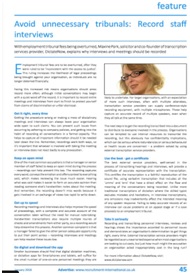Avoid unnecessary tribunals: Record staff interviews
Avoid unnecessary tribunals: Record staff interviews
Readers of Recruitment International learn the importance of recording staff interviews
Solicitor and co-founder of transcription services provider DictateNow, Maxine Park recently explained to the readers of Recruitment International how they can protect their organisation from legal trouble by recording staff interviews and meetings.
The cross-platform magazine is aimed at all recruitment professionals.
Providing individuals with bespoke reports and guides, industry insights and developments, and important news features, the magazine helps those working in recruitment to stay ahead of the game.
Maxine’s article highlights how companies can avoid serious and unnecessary legal battles by simply recording sensitive interviews and meetings as a way of protecting their business.
The article can be found in the January issue of the Recruitment International online magazine.
Alternatively, read Maxine’s advice here:
Avoid unnecessary tribunals: Record staff interviews
Employment tribunal fees are to be overturned, after they were ruled to be ‘inconsistent with the access to justice’. This ruling increases the likelihood of legal proceedings being brought against your organisation, as individuals are no longer deterred financially.
Facing this increased risk means organisations should press record more often according, to Maxine Park, solicitor and co-founder of transcription services provider DictateNow:
Although initial conversations may begin with a quiet word off the record, it is important to record entire meetings and interviews from start to finish to protect yourself from claims of discrimination or unfair dismissal.
Get it right, every time
Getting the procedure wrong or making a mess of disciplinary meetings and interviews can always leave your organisation wide open to such claims.
You can prevent such issues from occurring by adhering to company policies, and getting into the habit of recording all conversations in a formal capacity. This helps to capture all important information should it be needed later down the line.
Remember, recordings work both ways, so it’s important that whoever is involved with taking the meeting or interview does not react badly to any provocation.
Keep an open mind
One of the most common accusations is that a manager or senior member of staff failed to keep an open mind during the process – recordings can help prevent this too.
The recording captures every word, conveys the emotion and offers context to everything said, which makes reviewing the issue much easier. Hearing what was said makes it easier to form an accurate opinion than reading someone else’s handwritten notes about the meeting.
And remember, the recording doesn’t miss words because it gets involved in an exchange of views too rapid to write down.
Get up to speed
Recording meetings and interviews also helps improve the speed of proceedings, with a complete and accurate account of the conversation taken without the need for manual note-taking.
Handwritten transcriptions also require multiple rounds of checks and amendments from either party, so a recording would help streamline this process.
Another common complaint is that a manager failed to give the other person adequate opportunity to put their point across – recording interviews and meetings can help resolve these issues too.
Go digital and download the app.
Smaller businesses should find that digital dictation machines, or dictation apps for Smartphones and tablets, will suffice for the small number of one-on-one personnel meetings they are likely to undertake.
For larger organisations, with an expectation of more such interviews, often with multiple attendees, transcription service providers can supply conference-style recording equipment, with multiple microphones. These help capture an accurate record of multiple speakers, even when they all talk at the same time.
The next step is to get the recording transcribed into a document to distribute to everyone involved in the process.
Organisations can be tempted to use internal resources to transcribe the recording, but this obviously has confidentiality implications, which can be serious where redundancies or serious behavioural or health issues are concerned – a problem solved by using external transcription service providers.
Use the best – get a certificate
The best external service providers, well-versed in the process of transcribing hearings and interviews, will provide a certificate of accurate representation with the transcription.
This certifies the transcription is a faithful reproduction of the sound file, using verbatim transcription that includes all the ‘umms’ and ‘errs’ that have a direct effect on the flow and meaning of the conversations being recorded.
Unlike more traditional transcriptions of dictation where the skilled typist excludes mistakes and hesitations, in interview transcriptions, any omissions may inadvertently affect the intended meaning of any spoken response.
Failing to keep accurate records of an interview can cause problems at an appeal stage or if a case proceeds to an employment tribunal.
Take it seriously
Recording and transcribing personnel interviews, reviews and hearings shows the importance accorded to personnel issues and demonstrates an organisation’s determination to get things right, every time.
External transcription service providers might be regarded as an unwarranted expense when most organisations are looking to cut costs, but just how much might the accusation an organisation acted inappropriately cost in the long run?
For more information on DictateNow, visit: www.dictatenow.com







